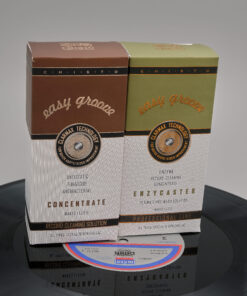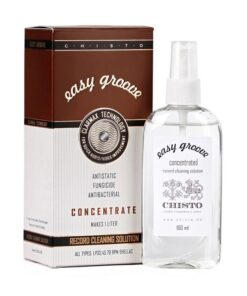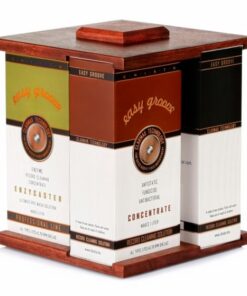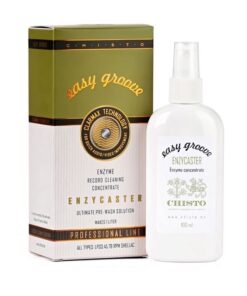CHISTO_REVIEWS, NEWS, REVIEWS
Disk Analoguer Review By Greg Carrier For Steve Hoffman Music Forums
My conclusion is that this product does seem to have an effect on the way the disc sounds. I’ve heard all the arguments that these products are snake oil, and that the digital data retrieval process isn’t affected by products like this — and to the degree I understand those arguments, they make sense to me. Still, I was curious enough to spend some money on this to try it out, and I think it works. My wife, who isn’t the least bit interested in justifying my purchase, backs it up (I chalk up her preference for the untreated discs to personal taste). I don’t think it makes my CDs sound like vinyl, but I do think it makes them sound MORE like vinyl.
Reviewed by Greg Carrier for Steve Hoffman Music Forums, January 2012
Chisto Disk Analoguer
Chisto Disk Analoguer is a product that you spray on the data side of a digital disc (then wipe dry with an included cloth). The claim is that it makes the disc sound more “analog.” I had read some positive reviews about a similar disc treatment, Mobile Fidelity’s Shine-Ola. I was curious. I ordered the Disk Analoguer.
I was able to find a couple of sets duplicate discs in my collection to use for testing. For one, Duncan Sheik’s Phantom Moon, I had two identical copies. For another, CSN&Y’s Deja Vu, I had two different pressings of the same mastering. I listened closely to the discs and didn’t hear any differences between either pair. (I know that some people can hear differences in different CD pressings of the same mastering — Barry Diament says he can, and I don’t discount that. I have little doubt that Barry’s ears, and his hardware, are much better than mine, however.)
I applied the product to one disc in each pair, and listened again. To my ear, the treated copy in each case sounds different — smoother, a more “round” sound. In other words, more like analog. I wouldn’t say the difference was dramatic, but it wasn’t hard to hear it, either. When I did a blind test (I shuffled the discs myself, purposely not thinking about which was which), it was easy to identify the treated disc in each case. But I still wasn’t sure that it was all in my head.
So, I tried it on my wife. She’s musical, played several instruments when she was younger, and likes music, but isn’t a serious collector or an audiophile in any way. I think she has a pretty good ear. I told her about the product and what it was supposed to do. I played her both pairs of discs. In both cases, she quickly identified a difference in the discs, and without prompting, described the difference pretty much the same way as I did — the treated disc having a smoother, rounder sound. She easily guessed which disc was treated in each case.
My conclusion is that this product does seem to have an effect on the way the disc sounds. I’ve heard all the arguments that these products are snake oil, and that the digital data retrieval process isn’t affected by products like this — and to the degree I understand those arguments, they make sense to me. Still, I was curious enough to spend some money on this to try it out, and I think it works. My wife, who isn’t the least bit interested in justifying my purchase, backs it up (I chalk up her preference for the untreated discs to personal taste). I don’t think it makes my CDs sound like vinyl, but I do think it makes them sound MORE like vinyl.
I am not affiliated with this company or anybody who works for them. They aren’t paying me anything to post this. I thought for a few days about posting, knowing it will probably start some kind of heated discussion about disc treatment products. But I believe that some of you who are willing to give this a try might be glad you did, so I wanted to share what I found. Of course, your results might be different, and I don’t assume any responsibility for the effectiveness of this product. I’m just passing along my experience. Take it for what it’s worth.
-
Product on sale
 Audiophile Vinyl Records Cleaning BundleOriginal price was: €50.00.€40.00Current price is: €40.00. excl. VAT
Audiophile Vinyl Records Cleaning BundleOriginal price was: €50.00.€40.00Current price is: €40.00. excl. VAT -
Product on sale
 Easy Start Vinyl Records Cleaning KitOriginal price was: €50.00.€40.00Current price is: €40.00. excl. VAT
Easy Start Vinyl Records Cleaning KitOriginal price was: €50.00.€40.00Current price is: €40.00. excl. VAT -
Product on sale
 Vinyl Records Cleaner Easy Groove ConcentrateOriginal price was: €35.00.€25.00Current price is: €25.00. excl. VAT
Vinyl Records Cleaner Easy Groove ConcentrateOriginal price was: €35.00.€25.00Current price is: €25.00. excl. VAT -
 Easy Groove Super Set€199.00 excl. VAT
Easy Groove Super Set€199.00 excl. VAT -
Product on sale
 Easy Groove Enzycaster – vinyl records prewash cleanerOriginal price was: €35.00.€25.00Current price is: €25.00. excl. VAT
Easy Groove Enzycaster – vinyl records prewash cleanerOriginal price was: €35.00.€25.00Current price is: €25.00. excl. VAT -
Product on sale
 Easy Groove Spray&Wipe vinyl records cleanerOriginal price was: €35.00.€25.00Current price is: €25.00. excl. VAT
Easy Groove Spray&Wipe vinyl records cleanerOriginal price was: €35.00.€25.00Current price is: €25.00. excl. VAT






